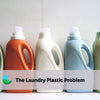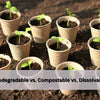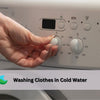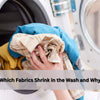Never Pour These Down Your Sink: How to Prevent a Clogged Kitchen Drain
- by Brodie Cook

A clogged kitchen sink is a real hassle to deal with. It slows everything down, leaves an awful smell, and sometimes even requires professional help. The good news? You can avoid a blocked drain by knowing what substances should never go down the drain. Many substances can easily clog your kitchen pipes, causing serious plumbing issues and costly repairs. Let’s look at things you should never put down your sink and how to safely dispose of them instead.
Things You Should Never Pour Down Your Sink

Many common household items seem harmless, but they can cause big problems inside your pipes and even damage your plumbing system. Leftover food, grease, and other substances can cause blockages that restrict water flow and put pressure on your pipes. Over time, this buildup may lead to a burst pipe, costly repairs, and even contamination of your water system. To avoid a clogged kitchen sink and serious plumbing issues, here are things to never pour down your sink.
Oils and Fats
Never pour cooking oils and fats in the drain. They might be liquid when hot, but they solidify when cooled, sticking to the insides of your pipes and causing a blockage. Leftover bacon grease and butter should never be poured down the drain. Instead, place them in a jar or bottle, then put them as a disposal unit in the garbage bin.
Coffee Grounds
Coffee grounds can also cause big problems. Avoid pouring them in the sink. They can absorb water and clump together, leading to a clogged pipe. Instead, coffee grounds can be composted or thrown in the rubbish bin.
Flour and Water
You might love baking, but do not put down your drains the leftover dough or starch. Do you ever noticed how flour turns into a thick paste when mixed with water and soap? That’s exactly what happens inside your kitchen drain, creating a sticky mess that can block the pipes.
Rice and Cooked Pasta
These starchy foods absorb water, expand, and stick to other food scraps, leading to clogged drains. this kind of leftover food should go in the waste bin or compost.
Meat
Tiny slices of chicken meat or minced beef left in the sink can cause a rot smell and clog your pipes. Make sure any meat scraps are disposed of in the waste bin before cleaning your dishes.
Leftover Paint and Paint Brushes
Oil-based and acrylic paints are things you shouldn't put in the sink; they will damage your drains and are harmful to water systems. Instead of pouring paint down the sink, mix it with kitty litter and let it dry before disposal. for the brush, rinse paint brushes in a bucket of water, then check with your local waste collection for proper disposal.
Paper Products
Items like paper towels, wet wipes, and little stickers from produce should go in the garbage disposal or be recycled. Do not put them in the drain because they may not break down like toilet paper, causing serious plumbing problems.
Common Dish Soap
Many people assume that dish soap helps break down grease. While water and soap do help rinse away some fats, A lot of commercial dish soaps contain surfactants and other chemicals that can contribute to grease buildup inside household pipes. Over time, these substances may cause blockages, making it harder for wastewater treatment systems to function properly, and their chemical residues can pollute the environment. (source: earth911.com)
To avoid a clogged kitchen sink, switch from common dish soaps to our Dishwashing Detergent Sheets. Unlike traditional dish soap, these sheets dissolve completely, leaving no thick residue behind. They’re a good to avoid plumbing issues while keeping your dishes clean. Plus, they come in plastic free packaging, helping to reduce pollution in rivers and oceans.
Eco-Friendly Ways to Unclog a Sink Drain

If you already have a clogged sink, don’t reach for a chemical drain cleaner immediately. There are safer ways to dispose of a blockage without damaging your plumbing system.
-
Use Baking Soda and Vinegar: Pour baking soda into the kitchen drain, followed by vinegar. Let it fizz and break down the clog before flushing with hot water.
-
Boiling Water: Sometimes, hot water is enough to dissolve oil-based clogs.
-
Sink Strainer: A simple way to avoid blocked drains is by using a sink strainer to catch bits of food before they go down your drain.
-
Compost Bin for Food Waste: Instead of rinsing food waste into the sink, start a compost bin to safely dispose of organic material.
When to Call a Professional
Even with good habits, plumbing issues can still arise. If your clogged sink or blocked drain doesn’t clear with natural methods, it’s time to seek help from a professional plumber. Ignoring slow drainage can cause a bigger problem, like a burst pipe or damage to your water treatment system.

 Dishwashing
Dishwashing Laundry
Laundry Bundles
Bundles Surfaces
Surfaces Toilet
Toilet Handsoap
Handsoap Multi-Purpose
Multi-Purpose Floor
Floor



